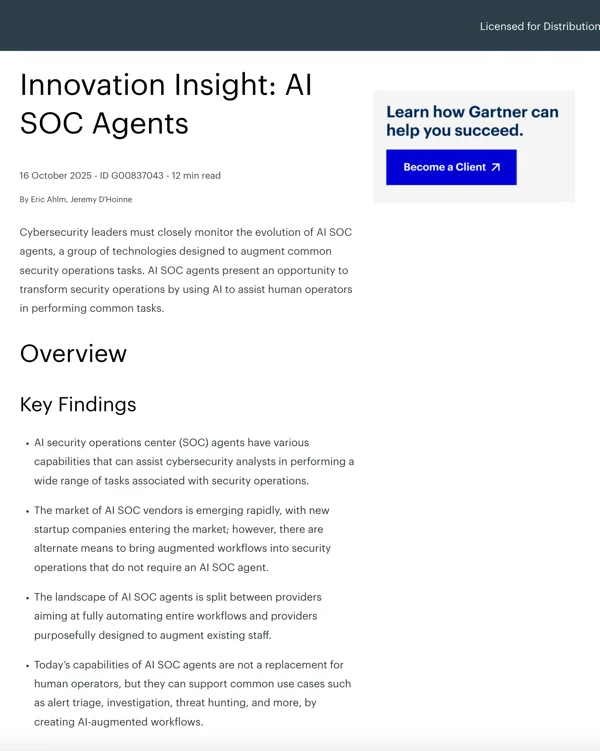
-min.webp)
The show floor at Black Hat this year was crowded with vendors promoting agentic AI for the SOC. The term was everywhere, but in many cases it meant little more than traditional automation dressed up in new language. Security operations teams know this kind of automation well: predefined playbooks that trigger when an alert matches a rule, scripts that pull context from specific sources, and workflows that always run in the same order. These can be useful, but they are brittle. If the situation changes, the workflow does not adapt and the process stops.
An agentic AI SOC solution is different. It begins an investigation the moment an alert fires, then plans, reasons, and adapts mid-investigation while keeping the analyst in control. Instead of executing static instructions, it decides what to do next based on the evidence it uncovers in real time. Underscoring their ability to transform security operations, Gartner recently named AI SOC Agents as an innovation trigger in the Hype Cycle for Security Operations 2025 (download complementary copy here.)
This post breaks down the core traits that make an AI SOC solution agentic, explains how Prophet Security’s architecture enables those traits, and compares the approach to traditional SOAR systems.
Definition: The ability to act without explicit, step-by-step human direction for every task.
In an agentic SOC solution, autonomy means that when an alert fires, the system can begin the investigation immediately. It determines which data sources to query, which entities to correlate, and what additional questions to ask without an analyst needing to intervene.
In Prophet Security:
{{ebook-cta}}
Definition: The ability to map out a multi-step investigation path dynamically.
Instead of running the same playbook, an agentic solution builds a plan based on the scenario. If initial evidence suggests account takeover, the plan might branch to email activity review, MFA event analysis, and OAuth token checks. If evidence shifts toward privilege abuse, it pivots to IAM changes and cloud API calls.
In Prophet Security:
Definition: The ability to draw inferences from incomplete or noisy data.
Reasoning in an agentic SOC solution involves forming hypotheses such as “This may be lateral movement using a stolen service account” and testing them by asking targeted questions of the data.
In Prophet Security:
Definition: The ability to adjust investigative strategy in real time as new evidence emerges.
In traditional automation, a playbook investigating a phishing alert might check message headers and linked domains. It will not suddenly start checking endpoint process trees unless it was built for that from the start. An agentic SOC solution can make that leap when evidence points in that direction. Users can also provide feedback that can seamlessly apply to investigations.
In Prophet Security:
SOAR is effective for repetitive, high-volume tasks where conditions are predictable. Agentic AI covers the investigative space where conditions are not predictable and where evidence needs to drive the path forward.
The SOC environment is unpredictable. Threat actors pivot, chain techniques, and exploit cross-domain blind spots. An agentic AI SOC solution thrives in this environment because it:
In a traditional SOC, investigations stall when automation hits its limits. With Prophet AI, they keep moving by autonomously gathering evidence, adapting to new findings, and presenting analysts with clear, contextual insights. The AI handles the repetitive work so humans can focus on interpreting results and making confident decisions. See it in action. Request a demo today.
In a SOC, “agentic” refers to an AI solution’s ability to act with autonomy, plan dynamically, reason about evidence, and adapt its approach as new data is uncovered. Autonomy in this context includes the ability to begin investigations automatically the moment an alert is ingested, without waiting for analyst intervention.
SOAR automation follows predefined playbooks that cannot adapt unless edited. An agentic AI SOC solution creates and adjusts investigation plans in real time based on the evidence it uncovers, rather than sticking to a fixed sequence.
Yes. In an agentic design, investigations are triggered automatically when an alert is received. The solution determines which data sources to query, what entities to correlate, and which additional questions to ask, without an analyst needing to initiate the process.
Adaptability ensures that the investigation follows the evidence, even if that means pulling data from new sources or changing the scope midstream. This allows the solution to pivot when the situation changes rather than being locked to an initial plan.
Reasoning allows the AI to connect partial clues, rule out false leads, and prioritize actions that are most likely to confirm or dismiss a threat. This makes investigations more targeted and reduces wasted time on low-value paths.
No. It handles data collection, correlation, and evidence-driven pivots, freeing human analysts to focus on interpreting results, validating findings, and making operational decisions.
Get Gartner's guidance on evaluating and adopting AI SOC agents

